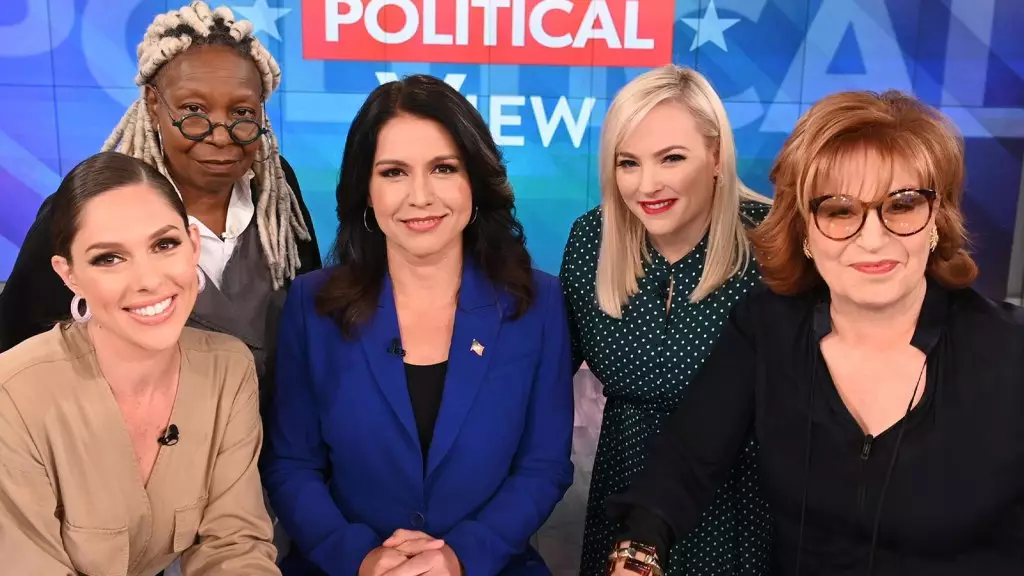Meghan McCain, the daughter of the late Senator John McCain, has emerged as a prominent figure in the political media landscape, especially since her departure from the ABC talk show, *The View*. Recently, her burgeoning friendship with former congresswoman Tulsi Gabbard has taken center stage, offering a lens through which to examine McCain’s post-*The View* experiences, including her candid reflections on her former co-hosts. This article aims to dissect McCain’s current social and political interactions while exploring the implications of her remarks on her past relationships.
At a recent event in Philadelphia called Stand with Women, McCain and Gabbard reminisced about their time on *The View*, where their friendship initially blossomed. McCain’s recollection of that day was not only a nod to their strong bond but also an illuminating critique of the environment on the show. During the event, Gabbard recounted how fearful the other co-hosts were of her during her guest appearance, to which McCain added her two cents. She described the atmosphere during Gabbard’s interview as one fraught with tension and hostility, noting that she felt compelled to defend her friend against what she viewed as brutal questioning from their peers.
The friendship between McCain and Gabbard highlights a growing narrative in media: women uniting against the pressures of a politically charged and often adversarial environment. Such interactions reflect broader issues faced by women in the media industry, where competition can overshadow solidarity. McCain’s willingness to endorse Gabbard publicly illustrates her desire to carve a new path in her post-*View* life, one that fosters genuine relationships rather than feigned camaraderie.
Since leaving *The View* in 2021, McCain has not hesitated to express her dissatisfaction with the show. Her public criticisms have been notable, describing it as a “rigged show” filled with “crazy old people.” Such language indicates not only her frustration but also a desire to distance herself from what she perceives to be a toxic environment. The implication is clear: the dynamics on the show were not conducive to her growth either personally or professionally.
McCain pointedly mentioned in a recent interview that she does not remain in touch with her former co-hosts. Her isolation from these relationships has led to speculation about the underlying tensions that led to her exit. This rift appears to be compounded by the fact that some former co-hosts, like Ana Navarro and Sara Haines, have seemingly alluded to her in negative contexts, leading McCain to declare, “These women will never quit me.” This reaction is a testament to her unwillingness to be minimized by those she feels have contributed to her discontent.
While McCain has severed ties with most of her former co-hosts, she has indicated that she maintains friendships with some behind-the-scenes staff at *The View*. This distinction underscores the complexity of relationships in the television industry, where friendship dynamics can often be influenced by public perception and career trajectories. McCain’s fear of her friends facing backlash for maintaining those connections speaks volumes about the culture of the industry, where loyalty can be tested by the scrutiny of the public eye.
Moreover, McCain’s recent remarks about having “not a chance in hell” of returning to *The View* highlight her strong determination to redefine her career path. The boldness of her statement suggests that she is not merely a passive participant in her narrative but rather an active architect of her future.
As Meghan McCain forges her path post-*The View*, her evolving friendships and vocal critiques demonstrate a significant realignment of her public persona. By aligning herself with figures like Gabbard, she seems poised to redefine her image in a landscape marred by past associations. The dissolution of her relationships with her former co-hosts illustrates the challenges many face while navigating complex professional dynamics. Ultimately, McCain’s journey is emblematic of a larger narrative in media about authenticity, resilience, and the importance of genuine connections amid the chaos of public life.
